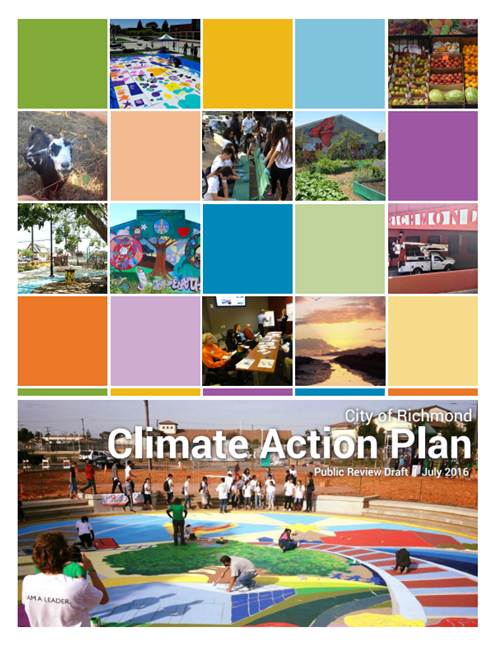
View this in your browser
* * * * * * *
Richmond City Council unanimously adopts innovative Climate Action Plan to achieve health and environmental goals
Document available at: www.richmondenvironment.org
RICHMOND, Calif. – The Richmond City Council unanimously approved an ambitious and innovative Climate Action Plan (CAP) to address the impacts of climate change and lower greenhouse gas emissions in Richmond. The CAP inventories the City’s emissions sources, establishes emissions reduction targets, and identifies City and community actions to reduce emissions. The CAP ensures that the City is prepared for the potential impacts of climate change on public health, infrastructure, ecosystems, and public spaces.
“I attended the UN Conference on Climate Change and it’s clear that cities are leading climate change efforts,” said Mayor Tom Butt. “The CAP positions Richmond to secure grant funding for implementation strategies that maximize local benefits and build community resiliency. It shows that we’ve done our homework and that the City is prepared to make investments that achieve the most benefits.”
The CAP formalizes the City’s commitment to using culturally and linguistically responsive outreach, emphasizing community participation and benefits. Students, residents, and businesses are essential partners to address climate change locally. An engaged community will be better prepared to tackle local climate action goals in energy efficiency, waste reduction, water conservation, sustainable transportation, and access to community gardens and healthy food.
The City completed a climate change adaptation study in partnership with the Bay Conservation and Development Commission’s Adapting to Rising Tides Initiative as an initial step to prepare the community for the impacts of climate change. The CAP builds on the goals and policies in the City’s General Plan 2030 and the Health in All Policies (HiAP) Strategy and Ordinance to advance the City’s efforts to build heath equity by reducing local GHG emissions.
“Health co-benefits, youth engagement, and our partnerships with Professor Jason Corburn, the UC Berkeley Department of City and Regional Planning and School of Public Health, and the UC Berkeley Center for Cities and Schools’ Y-PLAN program make the CAP an innovative implementation plan. The CAP benefited from involving over 250 enthusiastic Richmond youth in the planning process, and integrating the community’s commitment to health equity,” said City Manager Bill Lindsay.
Richmond’s youth represent the community’s foundation for a sustainable and resilient future. Young people embrace climate-smart behaviors, and are empowered to take ownership of Richmond’s future. Richmond High School’s Health Academy contributed directly to the development of the CAP, including the 10 top personal actions residents can take to support climate action in their daily lives.
“The City developed a plan that showcases the latest best practices of prioritizing community health in climate action planning. UC Berkeley held a graduate planning course focused on identifying best practices for the Richmond CAP. It’s rewarding to see leading ideas reflected in the policy recommendations incorporated throughout the plan,” said UC Berkeley Professor Jason Corburn, a nationally recognized researcher in health equity and city planning.
The City Council also unanimously supported developing an incentive program for residential solar and energy efficiency upgrades for apartment buildings and small businesses, and electric vehicle charging stations. The City Council also requested that staff include an option to convert City facilities to 100% renewable energy through MCE’s Deep Green program in the mid-year budget evaluation.
|

